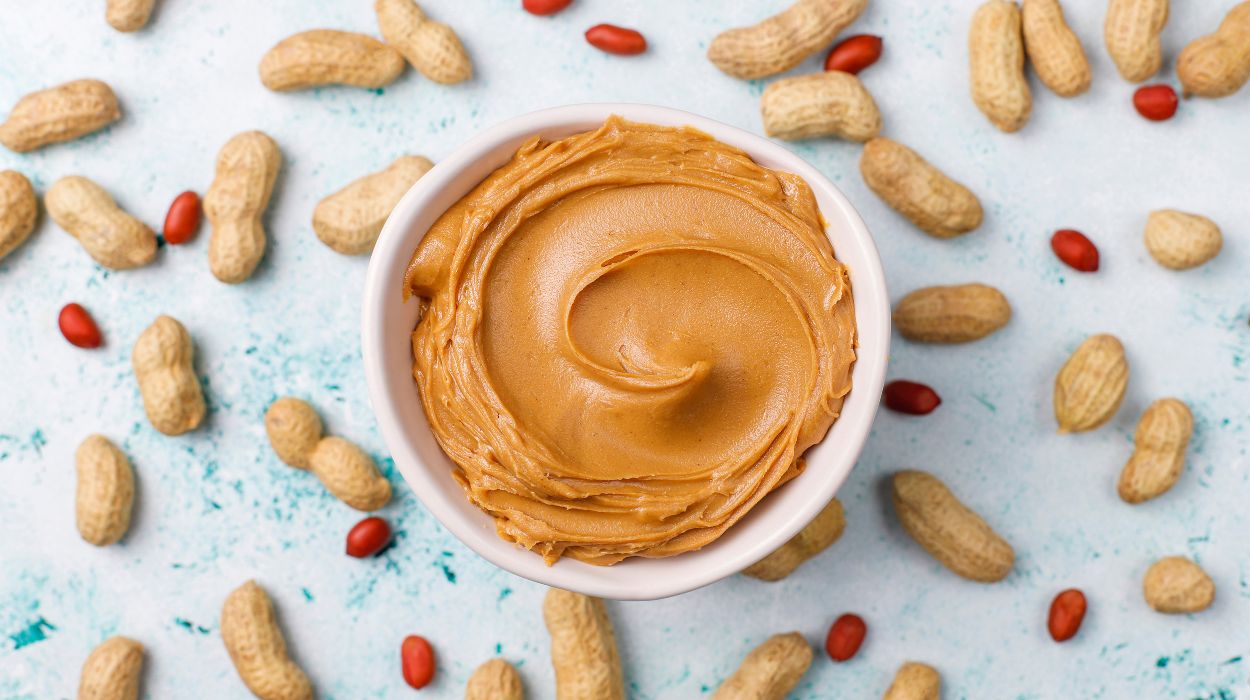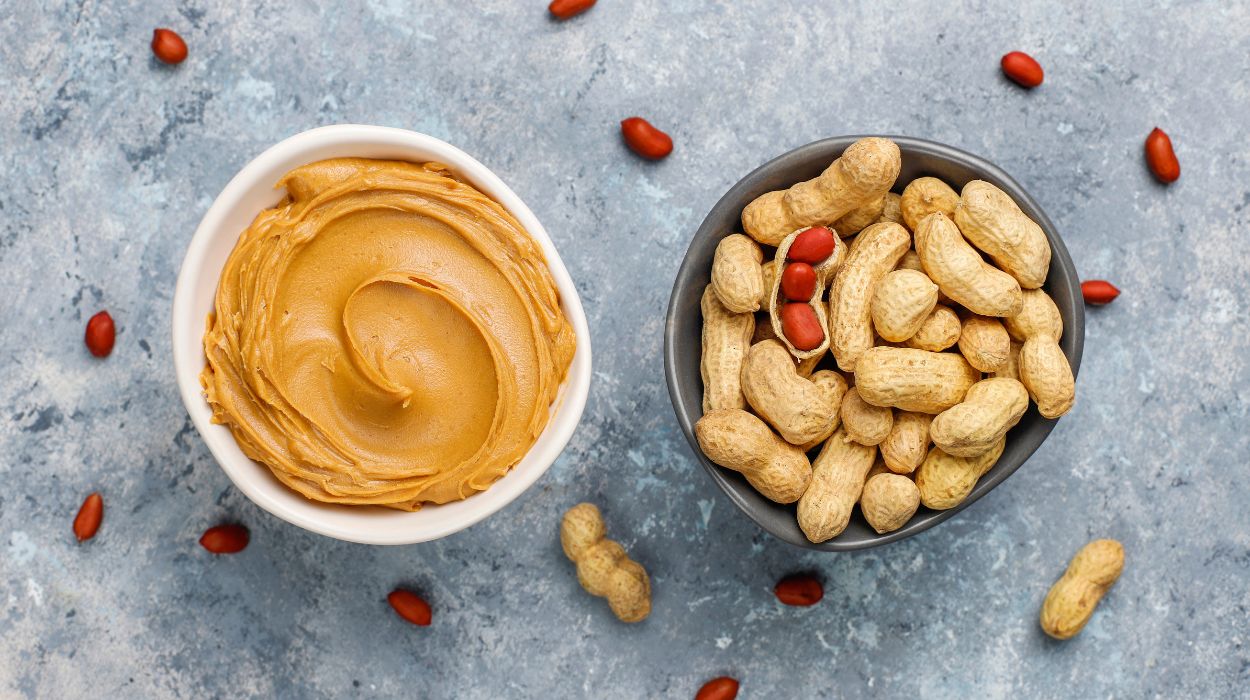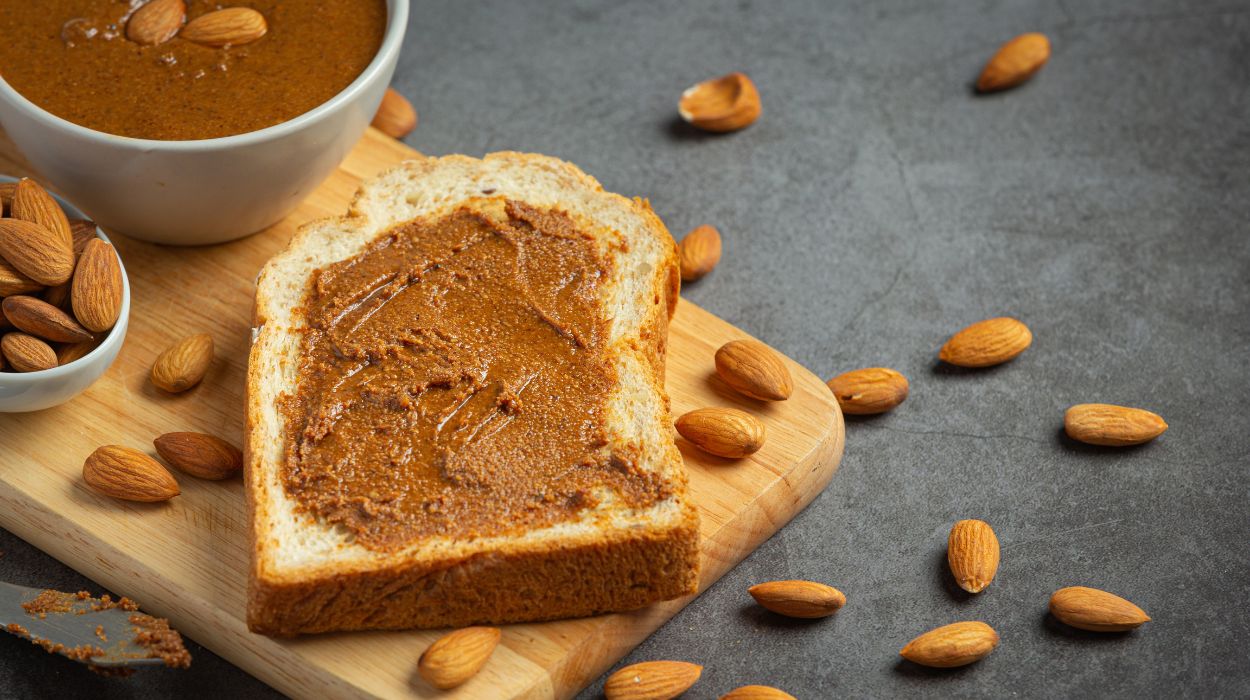Peanut Butter For Weight Gain: Things You Should Know In 2024

Gaining weight can be hard for some people, especially if you have health conditions that restrict your food intake. For example, Crohn’s disease can make it challenging to eat enough calories from healthy foods — and fiber further reduces calorie intake. Finding calorie-dense foods to aid weight gain is a priority.
Peanut butter is a nut butter made from ground-up roasted peanuts, also called groundnuts. Eating more peanuts can have health benefits, such as a reduced risk of cancer.[1] But is peanut butter good for weight gain? And, if you overdo it, will peanut butter make you fat?
Read on to learn whether consuming peanut butter can help you gain weight and how much peanut butter to eat to avoid excess body fat.
Does Peanut Butter Increase Weight?
Eating peanut butter will not make you gain weight per se. Of course, it depends on how much peanut butter you eat and how many calories you need to maintain your current weight.
Is Peanut Butter Good For Weight Gain?
It depends on how much peanut butter you eat. Nevertheless, there are several reasons why peanut butter is a good choice for healthy weight gain.
Calorie-Dense
To gain weight, you need to eat more calories than you are using up. Peanut butter is high in calories and good for you, making it perfect for healthy weight gain.
One suggested serving of peanut butter[2] — two tablespoons, around 30 grams — provides 188 calories and 16 grams of total fat.
High In Healthy Fats
Peanut butter is high in good fats called polyunsaturated and monounsaturated fatty acids, which are important for brain health,[3] mental health,[4] and heart health.
If you eat peanut butter every day, it will contribute to your required quota of the essential polyunsaturated fat, omega-6.
However, it is important to balance your intake of healthy fats,[5] especially omega-3 and omega-6. Without enough omega-3, omega-6 can promote inflammation.[6]
So, if you regularly eat peanut butter, ensure you’re also eating plenty of food sources of omega-3.[7] These include oily fish, chia seeds, flaxseeds, or — if you cannot eat enough food sources — omega-3 supplements.
Low In Saturated Fats
Peanuts are naturally low in saturated fat, too much of which is associated with an increased risk of cardiovascular diseases.[8]
However, some peanut butter has added fats, so check the label and buy natural peanut butter without added fat. Look for terms such as hydrogenated or partially hydrogenated and avoid these terms.
A Good Source Of Protein
Peanuts are not technically nuts but beans. This fact means they are higher in protein than nuts. Peanut butter tends to be the highest in protein compared to all other kinds of nut butter.
Protein is essential to preserve lean body mass.[9] As muscle mass is heavier than fat, gaining muscle mass will also help you increase your body weight to a healthy weight.
One serving of peanut butter[2] provides seven grams of protein. If you weigh 70 kilograms and aim for 0.8 grams of protein per kilogram of body weight, that’s already more than 12% of your daily protein requirements.
How Much Peanut Butter Per Day To Gain Weight?

Peanut butter does not necessarily lead to weight gain. Many nuts and seeds can help you lose weight. Studies suggest that those who regularly eat peanut butter and other nuts are less likely to gain weight.[10] This is likely because eating nuts is linked to a generally healthy diet and lifestyle.
Nevertheless, if your goal is weight gain, peanut butter is still the perfect energy-dense food for the job. You just need to ensure you are eating more calories than you are burning.
To do that, you need to calculate your daily calorie needs to ensure you are eating enough calories to get from your current weight to your weight gain goal. Once you have calculated how many daily calories you need to eat, you can work out how much peanut butter to add to your diet. To gain one pound per week, you need to eat 500 extra calories per day.
So, yes, adding peanut butter to your diet can help you gain weight, but only if you eat enough for it to contribute to your required daily calorie surplus.
Choosing The Best Peanut Butter For Weight Gain
Eating more peanut butter is the easy part. Peanut butter goes with almost anything, from celery sticks to toast. The tricky part is choosing the best peanut butter for your health.
The problem is not all peanut butter is good for you. Here are some tips for choosing the best peanut butter for a healthy diet.
Avoid Peanut Butter With Added Sugar
Unfortunately, many peanut butter brands add sugar, which provides unhealthy extra calories. Eating too many foods with added sugar is associated with chronic health conditions such as type 2 diabetes[11] and poor dental health.[12]
Sweetened peanut butter can also lead to sugar addiction[13] and increase the risk of unnecessary bingeing, which might lead to excessive body fat.
Avoid Peanut Butter With Added Fats
Some peanut butter has added palm oil to make a creamy consistency, but this is high in saturated fat and not good for your health. Palm oil is not only bad for human health; it is also bad for planetary health.[14] Palm oil production tends to be unsustainable and is linked to deforestation in the Amazon.
In general, saturated fat is not an essential nutrient and does not need to be part of a balanced diet since we can manufacture all that we need.
Make Your Own Homemade Peanut Butter
This is the best option, and it’s easier than you think. Simply roast peanuts, with or without skins, and blend them in a high-speed blender until smooth.
If you do not have the equipment or time to make it yourself, some local health food stores might sell homemade peanut butter.
Buy Natural Peanut Butter
Natural peanut butter is a nutritious food rich in some essential vitamins and minerals, especially zinc, potassium, folate, choline, and magnesium. The more processed peanut butter brands tend to provide fewer healthy nutrients.
If you are not sure which peanut butter is natural, look for the telltale oil floating at the top of the jar. This happens because natural peanut butter tends to separate.
Alternatives To Peanut Butter

Not everyone can consume peanut butter. Some people do not like the taste, or you might be allergic to peanuts. What’s more, peanuts can harbor harmful bacteria, which produce toxins that harm human health.[15]
So what can you eat instead for healthy weight gain?
Here are some other types of nut butter you might want to try for healthy long-term weight gain.
Almond Butter
We like almond butter as an alternative to peanut butter because it has a similar nutrition profile. In fact, almond butter provides even more essential nutrients.
Similarly to peanut butter, one serving of almond butter[16] — two tablespoons — provides 196 calories and 6.7 grams of protein. This means almond butter has a similar weight gain potential.
Almond butter is also higher in some other micronutrients. Notably, two tablespoons of almond butter provide almost eight milligrams of the antioxidant micronutrient vitamin E. That’s four times the vitamin E content of peanut butter. In fact — partly because of the high vitamin E content — eating almonds daily is associated with anti-aging benefits.[17]
Regarding fat content, almond butter contains slightly more than peanut butter, with 18 grams of total fat per serving. However, almond butter also contains less omega-6 than peanut butter, which might be better for those with inflammatory health conditions.
Cashew Butter
Another popular nut butter is cashew butter. It is naturally sweeter than peanut butter but is more expensive and lower in nutrients.
Two tablespoons of cashew butter[18] provide 188 calories but only 5.6 grams of protein. Moreover, it provides less than half the polyunsaturated fats of peanut butter.
However, it’s higher in an important mineral most of us are deficient in — zinc. Studies suggest that zinc is linked to body weight regulation, and consuming more zinc is associated with weight gain.[19]
Coconut Butter
If you are looking for nut butter that’s high in fat but low in protein and other nutrients, coconut butter is a good choice. Made out of coconut flesh, 30 grams of coconut butter[20] provides 180 calories, 18 grams of fat, and only two grams of protein.
Less Popular Nut Butter Varieties
There are many other kinds of nut butter to choose from, but they are less popular because they tend to be more expensive. Nevertheless, you might want to try a few more nut butter alternatives to peanut butter:
- Hazelnut butter.
- Macadamia nut butter.
- Walnut butter.
- Pistachio butter.
- Brazil nut butter.
The Bottom Line
In this article, we answered the question, “Can peanut butter help you gain weight?”
Yes, peanut butter can help you gain weight, but only if it contributes to a daily calorie surplus. Although peanut butter is calorie-dense and high in healthy fat, eating more peanut butter won’t necessarily lead to weight gain. In fact, studies show that regular nut-eaters tend to lose weight rather than gain it.
The best thing about peanut butter for weight gain is that it’s relatively cheap and easy to add to your diet. Try eating peanut butter as a snack with celery sticks or apple slices, in a smoothie with banana and plant milk, or simply on toast.
+ 20 sources
Health Canal avoids using tertiary references. We have strict sourcing guidelines and rely on peer-reviewed studies, academic researches from medical associations and institutions. To ensure the accuracy of articles in Health Canal, you can read more about the editorial process here
- Naghshi, S., Sadeghian, M., Nasiri, M., Mobarak, S., Asadi, M. and Sadeghi, O. (2021). Association of Total Nut, Tree Nut, Peanut, and Peanut Butter Consumption with Cancer Incidence and Mortality: A Comprehensive Systematic Review and Dose-Response Meta-Analysis of Observational Studies. Advances in Nutrition, [online] 12(3), pp.793–808. doi:10.1093/advances/nmaa152.
- Usda.gov. (2023). FoodData Central. [online] Available at: https://fdc.nal.usda.gov/fdc-app.html#/food-details/174294/nutrients
- Bauer, I., Hughes, M., Rowsell, R., Cockerell, R., Pipingas, A., Crewther, S. and Crewther, D. (2014). Omega-3 supplementation improves cognition and modifies brain activation in young adults. Human Psychopharmacology: Clinical and Experimental, [online] 29(2), pp.133–144. doi:10.1002/hup.2379.
- Grosso, G., Galvano, F., Marventano, S., Malaguarnera, M., Bucolo, C., Drago, F. and Caraci, F. (2014). Omega-3 Fatty Acids and Depression: Scientific Evidence and Biological Mechanisms. Oxidative Medicine and Cellular Longevity, [online] 2014, pp.1–16. doi:10.1155/2014/313570.
- Simopoulos, A. (2016). An Increase in the Omega-6/Omega-3 Fatty Acid Ratio Increases the Risk for Obesity. Nutrients, [online] 8(3), p.128. doi:10.3390/nu8030128.
- Innes, J.K. and Calder, P.C. (2018). Omega-6 fatty acids and inflammation. Prostaglandins, Leukotrienes and Essential Fatty Acids, [online] 132, pp.41–48. doi:10.1016/j.plefa.2018.03.004.
- Cholewski, M., Tomczykowa, M. and Tomczyk, M. (2018). A Comprehensive Review of Chemistry, Sources and Bioavailability of Omega-3 Fatty Acids. Nutrients, [online] 10(11), p.1662. doi:10.3390/nu10111662.
- Nettleton, J.A., Brouwer, I.A., Geleijnse, J.M. and Hornstra, G. (2017). Saturated Fat Consumption and Risk of Coronary Heart Disease and Ischemic Stroke: A Science Update. Annals of Nutrition and Metabolism, [online] 70(1), pp.26–33. doi:10.1159/000455681.
- Deer, R.R. and Volpi, E. (2015). Protein intake and muscle function in older adults. Current Opinion in Clinical Nutrition and Metabolic Care, [online] 18(3), pp.248–253. doi:10.1097/mco.0000000000000162.
- Freisling, H., Noh, H., Slimani, N., Chajès, V., May, A.M., Peeters, P.H., Weiderpass, E., Cross, A.J., Skeie, G., Jenab, M., Mancini, F.R., Boutron-Ruault, M.-C., Fagherazzi, G., Katzke, V.A., Kühn, T., Steffen, A., Boeing, H., Tjønneland, A., Kyrø, C. and Hansen, C.P. (2017). Nut intake and 5-year changes in body weight and obesity risk in adults: results from the EPIC-PANACEA study. European Journal of Nutrition, [online] 57(7), pp.2399–2408. doi:10.1007/s00394-017-1513-0.
- Stanhope, K.L. (2015). Sugar consumption, metabolic disease and obesity: The state of the controversy. Critical Reviews in Clinical Laboratory Sciences, [online] 53(1), pp.52–67. doi:10.3109/10408363.2015.1084990.
- Chi, D.L. and Scott, J.M. (2019). Added Sugar and Dental Caries in Children. Dental Clinics of North America, [online] 63(1), pp.17–33. doi:10.1016/j.cden.2018.08.003.
- DiNicolantonio, J.J., O’Keefe, J.H. and Wilson, W.L. (2017). Sugar addiction: is it real? A narrative review. British Journal of Sports Medicine, [online] 52(14), pp.910–913. doi:10.1136/bjsports-2017-097971.
- Kadandale, S., Marten, R. and Smith, R. (2018). The palm oil industry and noncommunicable diseases. Bulletin of the World Health Organization, [online] 97(2), pp.118–128. doi:10.2471/blt.18.220434.
- Sithole, T.R., Ma, Y.-X., Qin, Z., Wang, X.-D. and Liu, H.-M. (2022). Peanut Butter Food Safety Concerns—Prevalence, Mitigation and Control of Salmonella spp., and Aflatoxins in Peanut Butter. Foods, [online] 11(13), p.1874. doi:10.3390/foods11131874.
- Usda.gov. (2023). FoodData Central. [online] Available at: https://fdc.nal.usda.gov/fdc-app.html#/food-details/168588/nutrients
- Rybak, I., Carrington, A.E., Dhaliwal, S., Hasan, A., Wu, H., Burney, W., Maloh, J. and Sivamani, R.K. (2021). Prospective Randomized Controlled Trial on the Effects of Almonds on Facial Wrinkles and Pigmentation. Nutrients, [online] 13(3), p.785. doi:10.3390/nu13030785.
- Usda.gov. (2023). FoodData Central. [online] Available at: https://fdc.nal.usda.gov/fdc-app.html#/food-details/170163/nutrients
- Abdollahi, S., Toupchian, O., Jayedi, A., Meyre, D., Tam, V. and Soltani, S. (2020). Zinc Supplementation and Body Weight: A Systematic Review and Dose–Response Meta-analysis of Randomized Controlled Trials. Advances in Nutrition, [online] 11(2), pp.398–411. doi:10.1093/advances/nmz084.
- Usda.gov. (2023). FoodData Central. [online] Available at: https://fdc.nal.usda.gov/fdc-app.html#/food-details/2017433/nutrient



